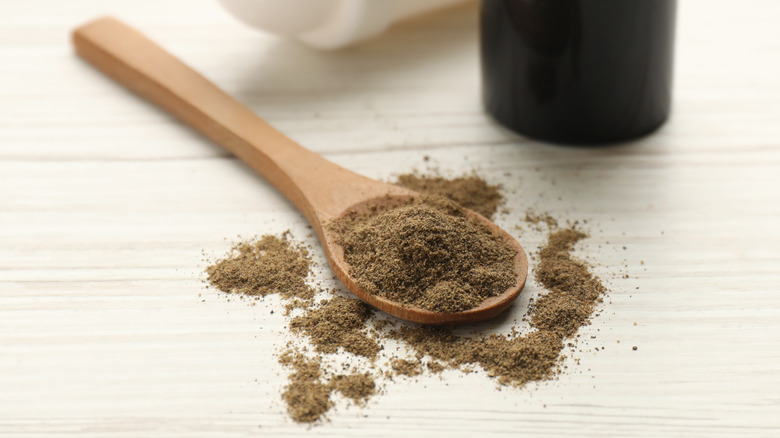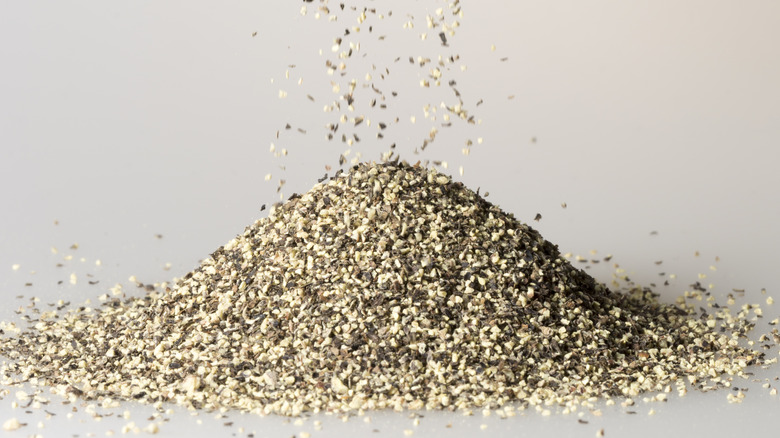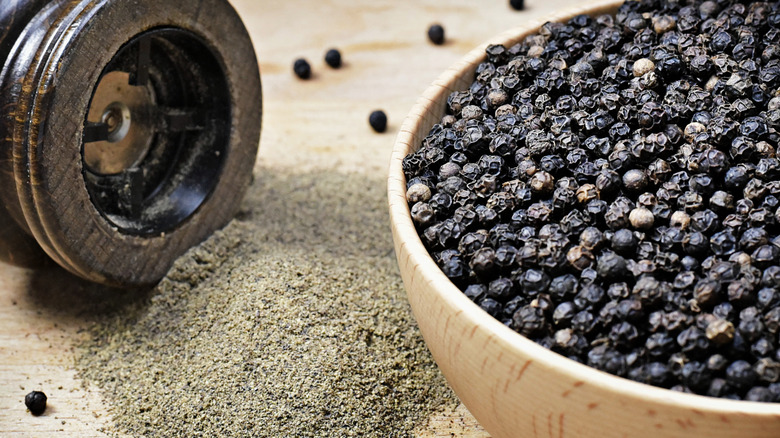Does Ground Pepper Expire?
Your salt shaker might clump, but it will last forever. How about the pepper shaker? Does pepper have the same longevity? Not quite. That goes for any herb and spice, per Insider. As soon as they're harvested, Father Time is coming for them. Air causes oxidation, which alters the flavor. Light and heat drain the color. A small amount of moisture can cause them to clump. A lot of moisture can create mold and ruin that entire container. Add all of that up and eventually, pepper will have lost its characteristic potency.
The best way to buy, and store, dried herbs and spices, like pepper, are in airtight containers. These minimize oxidation while keeping moisture and humidity at bay. Keep those containers out of the light. So, the countertop isn't a great place. Opt for a cupboard or cabinet, but make sure it's not near the oven. That's enough heat to age pepper prematurely. Follow those rules and ground pepper should last two to three years.
Still, even pepper that's survived hiding in the cupboard well beyond the use-by date, will be safe to eat, per Still Tasty. The dates on spice packaging aren't like the expiration date for a pound of burger. It's just the estimated amount of time that the pepper has been at, or near, its peak flavor, not that it'll get you sick.
When is the right time to let go?
If you're not sure about your pepper, Healthline recommends sprinkling some into your palm and rubbing it between your hands. If it still smells vibrant and piquant, it's still fine. Also, give it a taste, if it inspires a "meh," it's probably time to move on and replace that pepper.
Of course, it's also entirely possible that your pepper is aging, but it also still has some life left in it. If you think your pepper falls in this category, Insider suggests toasting it in a dry pan while stirring for a few moments in order to liven the flavor up. Be careful, though, ground spices burn quickly. An even better idea is to fry them with some oil at the outset of the recipe. This has a similar rejuvenation effect but is less prone to burning, and you'll have infused the fat with some peppery pluck.
America's Test Kitchen likes to coax every bit of black pepper flavor by adding it at two points during cooking. Adding pepper at the end of cooking will ensure that all of the aroma and flavor remain once the dish hits the serving plate. However, you also don't want to forget to add pepper at the beginning, too. Those bright, floral notes will fade throughout cooking, but pepper's remaining essence will add depth and complexity.
For even longer life, leave it whole
The ultimate way to keep pepper as fresh as possible is to leave the peppercorns whole, per Healthline. Peppercorns can remain fresh for four years. Because they're intact, there's a minimal amount of surface area to oxidize and degrade. This goes for other peppercorns like white or pink, and also every other spice that's commonly ground, including cumin, coriander, nutmeg, fennel, and dried chiles. As with ground spices, these can be toasted before use to get the essential oils moving to amp up their impact.
There's no shortage of reasons you should start grinding your own pepper. In fact, according to a New York Times piece quoting Harold McGee's "On Food and Cooking," freshly grinding pepper into a dish will ensure that none of the pepper's essence evaporates into thin air. It all ends up where you want it, in the food. Plus, piperine is an active ingredient in black pepper, per Healthline, which has it's own specific set of advantages. It's a powerful antioxidant that will prevent cell damage, prevents digestive issues, and also enhances nutrient absorption.
Finally, if you've ever wondered why pepper is the only herb or spice to earn a spot on our tables next to salt, NPR does a deep dive.


